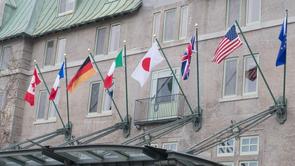 In this June 1, 2018 photo, flags of the Group of Seven (G7) nations and the European Union flag fly over the Fairmont Le Manoir Richelie hotel, the location for the G7 summit, in La Malbaie, Quebec. (ALICE CHICHE / AFP)
In this June 1, 2018 photo, flags of the Group of Seven (G7) nations and the European Union flag fly over the Fairmont Le Manoir Richelie hotel, the location for the G7 summit, in La Malbaie, Quebec. (ALICE CHICHE / AFP)
Japan has raised concerns about British proposals to invite Australia, India and South Korea to a meeting of Group of Seven foreign ministers and have them sign up to a joint charter with the forum, according to a diplomatic cable seen by Bloomberg.
Prime Minister Yoshihide Suga’s government “pushed back strongly,” the note says, arguing that the aim of the summit should be to rebuild the G-7 after a difficult year, and not “institutionalize” a relationship with the invited guests.
Prime Minister Yoshihide Suga’s government “pushed back strongly,” the note says, arguing that the aim of the summit should be to rebuild the G-7 after a difficult year, and not “institutionalize” a relationship with the invited guests
The forum’s European members –- France, Italy and Germany –- hold similar views, and some of its diplomats have expressed concerns that the UK is attempting to reshape the G-7 by the back door.
ALSO READ: Kyodo: Japan seeking to keep ROK out of G7
Prime Minister Boris Johnson, who is hosting this year’s G-7, has invited South Korea, India and Australia to attend the leaders’ summit in Cornwall in June. While it is standard practice for a Group of Seven host to invite guest countries, their involvement through the process is typically limited, but according to a person familiar with Johnson’s plans, the guests’ participation this year will be deeper than usual.
‘Open Societies Charter’
It was during a virtual meeting of the group’s political directors on Jan 22, that the UK told the other six members it was planning to ask the three countries to attend parts of a foreign and development ministers’ meeting, and have the G-7 sign an “Open Societies Charter” with them. Japan pushed back despite reassurances that Britain doesn’t want to expand or dilute the G-7, according to the cable. UK Foreign Minister Dominic Raab is hoping to hold the meeting in person May 3-6 in Wales.
The idea of expanding the G-7 was floated by Trump last year. In addition to Australia, South Korea and India, he proposed re-inviting Russia, which was ejected after the annexation of Crimea.
President Joe Biden hasn’t indicated where he stands on the issue but has said he wants to convene a summit of democracies. And prominent voices in both the UK and the US have continued to call for the group to open its doors to new members.
For Japan though, South Korea’s participation is awkward given renewed tensions stemming from its 1910-1945 colonial rule over the Korean Peninsula, and it doesn’t want to see membership or a privileged status extended to Australia and India, in particular, either -- European G-7 diplomats said Japan’s objections are in part likely because it wants to be the only Asian country in the forum.
ALSO READ: S. Korea's Moon tells Trump he would accept invitation to G7 summit
“Our country will respect the judgment of the host country,” Japan’s prime minister told a parliamentary committee on Tuesday. “While we respect that, our stance is that it’s extremely important to maintain the framework of the G-7.”
During the same panel meeting, Foreign Minister Toshimitsu Motegi said he discussed the matter with US Secretary of State Antony Blinken, adding “it is important for G-7 to work together now.”
The Japanese Foreign Ministry emailed similar comments in response to Bloomberg’s questions. The UK government declined to comment.
Following last week’s virtual meeting of G-7 political directors, a British diplomat wrote to colleagues saying the UK would need to find a way of managing Japan’s concerns while still delivering the wider goal of building a broader partnership of open societies.
Repair and Reinvigorate
The UK’s other plans have been mostly welcomed by the rest of the group as an opportunity to repair and reinvigorate the G-7, and multilateralism more generally, after what the cable describes as a “dysfunctional” 2020.
Under the US presidency, the group failed to offer a collective response to the coronavirus pandemic and managed to produce only two joint statements.
READ MORE: Trump postpones G7 summit, seeks to expand list of invitees
Officials from the six participating governments were told that the Foreign and Development track of the G-7 will center on three themes: open societies focusing on shared values and human rights; sustainable recovery, covering girls’ education, food security, climate action and vaccines; and renewing partnerships with like minded countries, as well as the Association of Southeast Asian Nations and engagement with Africa.


